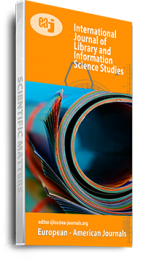Digitization of information resources for making digital library is the process of converting information into a digital (i.e. computer-readable) format. The result is the representation of an object, image, sound, document, or signal (usually an analog signal) obtained by generating a series of numbers that describe a discrete set of points or samples. The result is called digital representation or, more specifically, a digital image, for the object, and digital form, for the signal. On the one hand it can be argued that dramatic changes have been made at academic libraries in response to the new digital information environment. Most academic libraries, including University Libraries in Nigeria, offers a wide range of digital services and resources. But on the other hand, at a closer examination, one will find that these services and resources are mainly organized according to traditional library principles. In this case a guiding principle for the digital library need to be set up to create systematic and well organized general services and e-resources, for example subject specific gateway services. Thus, the digital part of the library functioned as an extension of the traditional library, an enterprise on the side with relatively high priority in this digital age, especially for of e-journals
Citation: Olubiyo P.O. and Olubiyo L.M. (2023) Digital Library Services in University Libraries in Nigeria: A Literature Study, International Journal of Library and Information Science Studies, Vol.9, No.4, pp.1-12
Keywords: Nigeria, digital library services, university libraries

